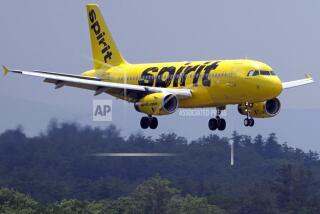An Industry in Turbulence
- Share via
Frank Borman, who presided over Eastern Airlines just before its turbulent descent into bankruptcy during the early 1990s, declared that “capitalism without bankruptcy is like Christianity without hell.”
United Airlines seems poised to learn whether an imminent stop in Bankruptcy Court will lead to redemption or simply more pain. Considering the decade of crippling mutual distrust between airline management and employees, the bets can hardly be more than even.
United’s financial woes won’t immediately disrupt travel, but they will add to the uncertainties facing travelers dependent on an airline industry awash in red ink, a long-troubled passenger rail system and a relatively small interstate bus system that’s struggling for consistent profits.
At least Bankruptcy Court is where United belongs, joining US Airways, which has been operating under bankruptcy protections since August. Chicago-based United’s financial problems existed well before the Sept. 11 terrorist attacks buffeted an already shaky airline industry.
United’s management and powerful unions, whose members control 55% of the parent company’s stock, must use the court’s shelter to bridge their differences or risk slipping into a war of attrition like that which led to Eastern’s demise.
Competitors might benefit from snapping up potentially lucrative routes that United could be forced to abandon. But the industry lost a cumulative $7 billion in 2001 and will have lost another $7 billion this year. It can’t afford to take comfort in United’s plight. American Airlines continues to lay off employees, and Delta Air Lines is scrambling to create a low-cost alternative to combat such fast-growing carriers as Southwest Airlines and JetBlue Airways.
The bankruptcy of two major airlines, the industry’s increased security costs after Sept. 11 and the stalled economy are only the latest twists in the industry’s struggle since being deregulated in 1978.
By rejecting United’s application for a $1.8-billion federally backed loan, the Bush administration signaled that it intends to continue letting the market sort out the airline industry’s considerable troubles. The government can’t, however, let the market ensure that cash-strapped operators don’t cut corners and put passengers in danger.
United (if it survives) and US Airways will continue to shed unprofitable routes and leave more small cities without air service. Congress is threatening to drop Amtrak’s money-losing interstate lines, and long-distance bus service remains weak.
The Bush administration’s hands-off transportation policy could have repercussions on an economy that depends on a reliable nationwide transportation system. Those ramifications need serious study -- free market or not.
More to Read
Inside the business of entertainment
The Wide Shot brings you news, analysis and insights on everything from streaming wars to production — and what it all means for the future.
You may occasionally receive promotional content from the Los Angeles Times.










